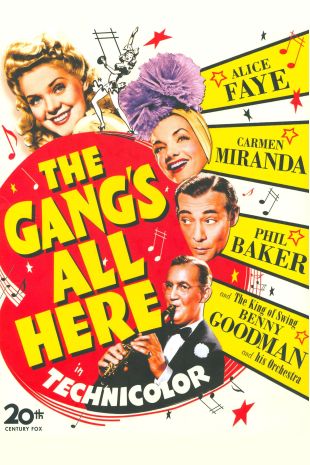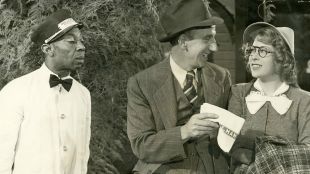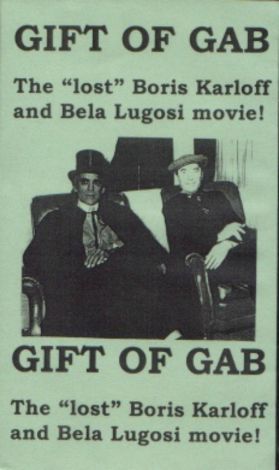Phil Baker was a comic personality and performer whose stardom, sad to say, was confined to a specific generation: in the 1920s and '30s he was a veritable fixture in the theater world as the comedic sparkplug of numerous revues, and in the latter decade he made the leap to radio with considerable success. By the 1930s and '40s, he bid fair to become a film star, but the right scripts and vehicles weren't there and he remained best known for his radio work. Baker was born in Philadelphia in 1896, to a middle-class family with no particular contacts in the entertainment world. He was musically inclined, however, a talent that manifested itself when he received an accordion as a bar mitzvah gift and learned to play it on his own. Before he was far into his teens, he was working as an office boy to future Universal Pictures founder Carl Laemmle at the Imp Film Company, and he was soon bitten by the performing bug in a way that simply wasn't going to be sated by playing the accordion at school or at parties.
Baker ran away from home and ended up in Boston, where he financed his first night by winning an amateur talent competition and taking away the princely sum of 50 cents. There followed more amateur nights as he headed to Fall River, and then on to New York, where he became a part of a violin-and-accordion duo with Ed Janis that was as popular for their comic schtick as for their music. From there, he leaped into a partnership with Ben Bernie, and "Bernie & Baker" topped the vaudeville circuit before they split up the act. Baker joined the legitimate stage when Ziegfeld brought him into his Midnight Frolics, and he was later cast in the Greenwich Village Follies and other revue-type shows, where his quick wit soon began supplanting his music as the main focus of his act, and by the time he was cast in the Music Box Revue he was a star performer. A visit to England proved disastrous as his opening night audience sat silently through his jokes (though they did join in the music-making), but on his return he picked up exactly where he left off, and he was soon a part of such top entertainment vehicles as the stage revue Artists & Models. Baker also composed songs, including the hits "Park Avenue Strut" and "Pretty Little Baby." Apart from his overall success, Baker also always claimed that he originated the use of the "stooge" in modern comedy. As the story went, he was in the middle of performing one night when he found himself being heckled by a man in the fourth row; the man turned out to be an out-of-work comic, and the audience found their spontaneous give-and-take so funny that Baker hired the man to repeat his outburst as part of the act in subsequent shows, which greatly elevated Baker's already considerable popularity. Among those who passed through the spot as Baker's second banana was Sid Silvers, who went on to stardom in his own right on-stage.
Baker had the desire to be taken seriously as an actor, and this proved his undoing financially. He mounted expensive productions of such serious works as Idiot's Delight as star vehicles for himself, and a lot of money in unsuccessful touring productions. Onscreen, he found occasional work pretty much as himself, or characters very close to his stage persona, in movies such as The Goldwyn Follies. Somehow, though, he never caught on in the way that other vaudeville and burlesque comic performers, such as Olsen & Johnson or Abbott & Costello did during the early '40s. It was in radio, however -- which was bigger and more influential than the movies for much of the 1930s -- that he became a media star. Debuting with his own show in 1933, Baker was busy on the airwaves for more than a decade. And in 1942, he became the host of a ground-breaking radio show called Take It or Leave It, often credited as the first modern quiz show in American popular culture. Baker served as quiz-master with a gently jocular tone for the lighthearted proceedings, which involved small amounts of money and lots of good-natured comic banter -- the top prize was for the "64-dollar question," a phrase that became part of the slang of the day and for many years after. He was also known for being especially kind to servicemen who were contestants, on one occasion handing a nervous navy enlisted man the script and telling him to handle the questions, which Baker answered before turning over the prize money to him. Old enough to have served in World War I, Baker was heavily involved with the Second World War as a civilian, supporting War Bond drives and other, similar activities.
In Busby Berkeley's The Gang's All Here (1943) -- probably his best movie -- Baker got to support all of those causes dear to him as well as playing lots of funny scenes. Baker's later attempts at dramatic theater work proved no more successful than Idiot's Delight had been, and at the end of the 1940s he retired from the stage. He starred in a film called Take It or Leave It late in the decade, based on his hit radio show, and also tried to make the jump to television. His small-screen appearances, however, were relatively unmemorable, and few younger viewers coming along after World War II had any idea of who he was. His marriage to Irmgaard Erik precipitated a move to Copenhagen, and it was there that he passed away in late 1963, after more than a decade out of the limelight.


